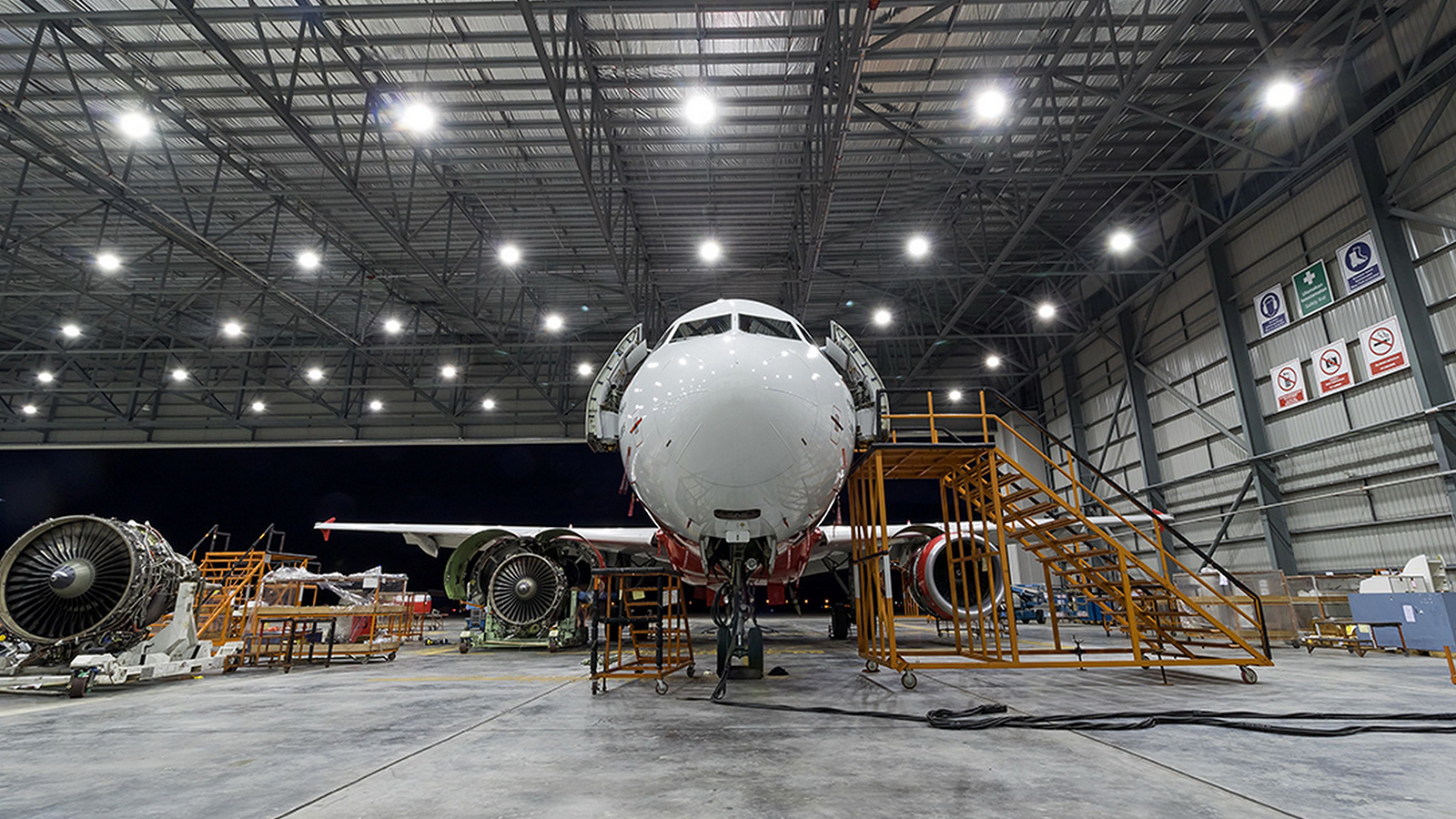Stay Up to Date
Submit your email address to receive the latest industry and Aerospace America news.
A digital transformation is underway in the aerospace industry toward blockchain information technology, a secure method of storing and sharing high volumes of data. Companies that want to compete effectively in a transformed industry should embrace the technology quickly but in a systematic way. Blockchain researcher and contractor Sam Adhikari explains.
As manufacturing, operations and maintenance become increasingly complex in the aviation and space sectors, a digital transformation is underway in the aerospace industry toward blockchain technology, an open source digital architecture for related data and their histories. The technology’s roots can be traced to the late 1990s, when software designers began conceiving of online cryptocurrencies, the most famous of which is bitcoin. The term blockchain refers to the fact that data is stored in numerous blocks, typically on multiple servers, sometimes on the public internet, but, in the aerospace world, increasingly within a private intranet of authorized users. The data is refreshed automatically at a frequency set by the network’s designers. MRO, short for maintenance, repair and overhaul, has been a catalyst for blockchain, but the possible aerospace applications are unlimited, ranging from MRO to collaborative design and simulations, to supply chain management, flight records, airline e-ticketing and loyalty programs, and protection against GPS spoofing.
A blockchain network registers aerospace components in a digital ledger accompanied by relevant data. Consider an example from MRO in aviation: Suppose a part malfunctions or big data predictive analytics points to this part as the root cause of a failure. Maintenance technicians can extract relevant information from the blockchain ledger and take appropriate corrective measures. In fact, all relevant parties can be authorized to access this ledger, which means the information is stored seamlessly across manufacturers, airlines and MRO service providers. This enables all MRO stakeholders to view documentation on the entire maintenance cycle of a single component.
It does not stop there. A blockchain network can include a feature called smart contracts, which are agreements between artificial intelligence software and its human programmers defining the diagnostic and corrective measures that should be taken automatically when a set of specific factors are present in the blockchain ledgers. In combination with big data analytics, blockchain and smart contracts are transforming the civilian and military aerospace industry.
Blockchain technology is a natural match for the civilian and defense aerospace industry. But several issues need to be kept in mind. While blockchain is real and promise of the future, experts continue to mature it. The return on investment must bring business value and integrate with other data and a company’s information technology governance document. A successful, enterprise-level digital transformation will have several components, and blockchain is just one of them. It is better to embrace this technology early and make sure legacy systems become compatible with this technology that provides promise for transparency, audit trail and strong security.
Advantage: Security
That said, the strengths are numerous. A blockchain network is virtually immutable, meaning the data residing within it cannot be changed without the knowledge of the collaborative parties. Even if a hacker managed to penetrate one block, the overall integrity of the data would remain intact, because the data is distributed among thousands of blocks containing cryptographically protected ledgers. These blocks are typically spread among multiple servers, with the blocks “chained” together securely with the latest cybersecurity technologies. The result is an incorruptible, distributed digital ledger that records virtually everything of value. The data in the blocks is digitally sealed with the cryptography, making it almost impossible to alter or manipulate. The blockchain network intermittently verifies the data, so that any outlying data would be detected quickly and rooted out. The verified data is visible to every node in the distributed network, and that transparency is extremely beneficial when different companies work together in the realm of aviation and space operations.
Easy auditing
Digital transactions forming the basic building blocks in a blockchain implementation can be tracked and audited all along the supply chain to MRO services with cyberconfidence. The data and business rules validation can be automated, minimizing need for manual reconciliation and exception handling. This reduces cost immensely. Because of greater transparency and visibility across the supply chain, manufacturing, after market, and maintenance operations, the overall aerospace operations improve immensely. Manufacturing, operational, and regulatory reports are detailed, integrated, verifiable, and immutable because of the decentralized blockchain technology. The digital ledger technology guarantees against single points of failure. Computer programs can be embedded in the blockchain network to generate smart contracts automating supply chain, manufacturing, and maintenance operational decision-making.
Use cases
Complex design of space and aviation systems is facilitated by the blockchain digital transformation technologies because many entities can collaborate closely during product development. Because of the built-in trust in the immutable data technology, shared blockchain ledgers can achieve rapid consensus among many participating parties. This is a fascinating advance over the current collaborative systems that lack historical version management and immutable record keeping for future reference in case of design failures and system malfunctions. In blockchain technology the distributed digital ledger leaves behind a transparent version and unchangeable history of original design, changes made, simulation data, test results, and a certification of record covering the sources of all components and the overall and subsystems.
Design-to-manufacturing time is reduced immensely and the product quality is augmented due to trust and transparency. In case of manufacturing disruption, all the involved parties can view the digitally secured distributed digital ledger and make the corrective decision at a lightning speed and accuracy.
In computational fluid dynamics, CFD , aerospace engineering entities are using blockchain to work collaboratively to reduce aviation-related drag and improve fuel efficieny, rocket payload shrouds and more. CFD simulation results are kept in chained blocks over the distributed networks for artificial intelligence-based adaptive and reinforced learning. Optimizing instruction codes in a blockchain development environment can automatically generate the best results.
In MRO implementations, the reliability, cost reduction and time to recover are dramatically changing the aviation and space industry. The biggest benefit comes in the form of an enhanced, forward-looking knowledge base that forms the biggest component of artificial intelligence-driven, smart, next generation aerospace and defense systems.
Then there is GPS spoofing. This is a cyberintrusion technique that sends fake signals to systems that use GPS data for navigation. It is difficult to detect these false signals, creating a risk that aircraft drift off course into dangerous environments or perhaps even collide. A blocked or jammed GPS satellite signal is relatively easy to detect almost instantaneously by trigger alarms built into the system. Aerospace companies are using blockchain digital ledgers for maintaining backup records of GPS-related information in cases where anti-spoofing systems indicate the incoming GPS data is manipulated and unreliable.
Aviation and flight records are increasingly kept in distributed immutable blockchain ledgers to increase aviation safety. Aviation-related anomaly data is fed into predictive analytics tools to avoid collisions and other disasters. The data comes from various heterogeneous networks and increasingly are kept in blockchain ledgers to make sure they are not manipulated in a central location. In many cases, the blockchain ledgers are used for back-up and source-of-data validation against cyberspoofing and other intrusions.
Aviation and space companies using blockchain technology
Lufthansa Industry Solutions has started the Blockchain for Aviation (BC4A) initiative to bring together software developers, manufacturers, MRO service providers, logistics providers and regulators, according to the Lufthansa Industry Solutions website. In November 2017, General Electric filed multiple patents to implement systems for tracking flight records, aircraft maintenance records, parts acquisition, and other information related to an aircraft’s operational lifecycle. IATA reportedly is in the process of evaluating blockchain digital ledgers for a payment network for aviation that could save close to $8 billion for airlines. Airbus wants to leverage blockchain technology in supply chain tracking and purchasing, according to its website. The company formed a blockchain working group to search and deploy blockchain applications. In December 2017, Boeing filed a patent on block-chain to implement a prevention mechanism in case of GPS spoofing events.
At the end of the day, the blockchain digital transformation is inevitable because of the security, immutable record keeping, and collaboration required to bring complex aerospace systems to market and operate them efficiently and safely. According to Accenture, blockchain is set to disrupt the aviation industry within the next one or two years. The technology would lower cost, increase reliability and improve convenience. Those in the industry should seize the day when it comes to the blockchain digital transformation.
Sam Adhikari
is the vice president for operations and research at Sysoft Corp., a big-data analytics company headquartered in Whitehouse Station, New Jersey. He is also a researcher at Stanford University and a certified information systems auditor, CISA. Adhikari is an associate fellow of AIAA and the chair of the institute’s Aerospace Cybersecurity Working Group. He is a past chair of the AIAA Software Technical Committee and currently a member of the Intelligent Systems Technical Committee. [email protected] and [email protected]
Related Posts
Stay Up to Date
Submit your email address to receive the latest industry and Aerospace America news.






